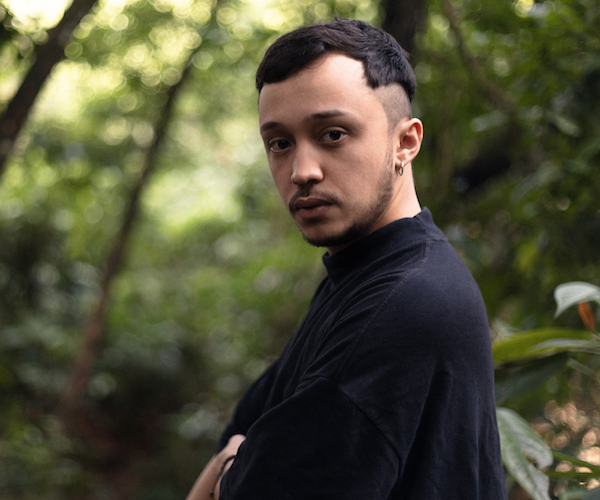In occasione del suo set al Notorius di Torino per Genau il 13 settembre, abbiamo avuto il piacere di intervistare Marcal, artista tra i più interessanti e promettenti della scena contemporanea.
Cresciuto in Brasile, Marcal porta nel suo suono una tensione costante tra tradizione e sperimentazione. I suoi set e le sue produzioni sono un intreccio dinamico di groove ipnotici, percussioni affilate e bassline che spingono — con una precisione che non perde mai il fuoco dell’intuito.
Inizialmente noto per l’uso creativo di suoni organici e texture inconsuete, oggi il suo percorso si sta affinando in una direzione più percussiva, dove le influenze di Samba e Bossa Nova non sono citazioni nostalgiche, ma strumenti per scolpire una techno viva, fluida, profondamente ritmica.
La sua musica ha visto la luce su label essenziali della scena elettronica come Rekids, Enemy e Token, etichette diventate luoghi espressivi perfettamente in linea con la sua identità, capace di diventare un manifesto unico di un sound riconoscibile.
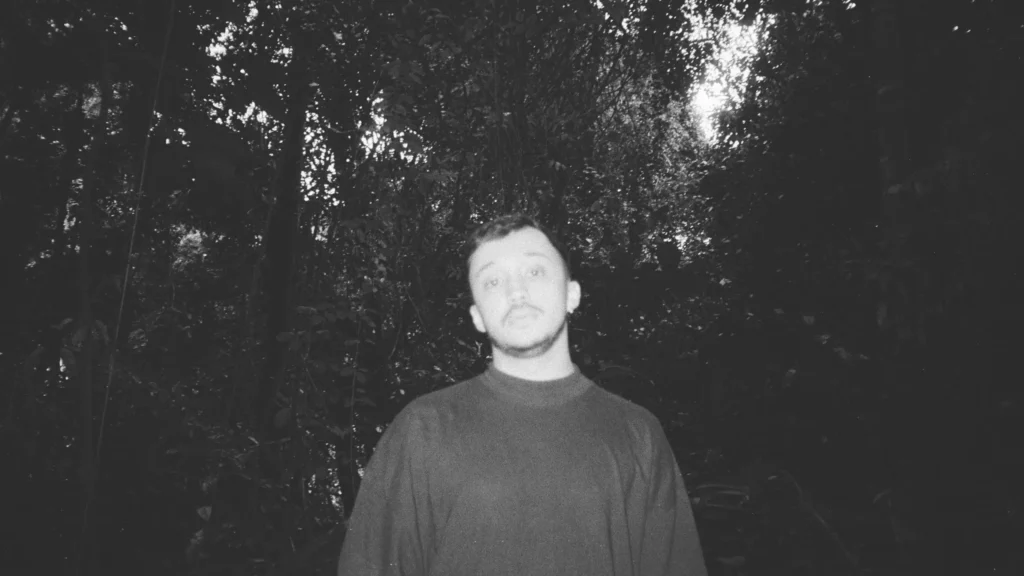
Credit Photo: Thiago Daher
Dalla primavera 2025, Marcal ha intrapreso un tour che riflette il suo momento d’oro: Awakenings Upclose Festival, le sue date imperdibili al Berghain, e la chiusura di Bassiani alla sua seconda gig a Tbilisi. Ogni tappa conferma la sua capacità di trasformare il dancefloor in un’esperienza di immersione totale.
In occasione del suo set lo scorso 20 settembre al Notorius di Torino per Genau e della nuova release sulla label di Freddy K che potete preordinare qui, abbiamo avuto il piacere di approfondire con lui alcuni aspetti del suo lavoro musicale. Di seguito l’intervista completa.
Ciao Marcal e benvenuto su Parkett! Come stai in questi giorni? Ed è fantastico averti qui a Torino. Come ti senti in vista del live e cosa rappresenta per te l’Italia?
Ciao! Sono davvero entusiasta per stasera, è la mia prima volta a Torino. L’Italia per me rappresenta molta storia passata e anche tanto futuro: storia antica, ma anche tanto buon cibo. Sono davvero emozionato per questa sera, per far ballare le persone e farle divertire.
Vorrei chiederti delle tue origini. Sei nato e cresciuto in Brasile. Come pensi abbia influito sulla tua musica? E credi che abbia sempre avuto lo stesso impatto sul tuo suono, e su quello che poi hai usato nelle tue tracce?
Sì, assolutamente. Penso che il mio senso del groove e del ritmo venga in parte dalle mie radici brasiliane. Mi piace ascoltare molta la Samba, la Bossa Nova, e penso che in qualche modo questo si rifletta nel mio suono. È qualcosa che cerco di mescolare con la techno, che a volte viene vista come musica elettronica un po’ robotica, ma non lo è del tutto. Puoi metterci molto groove e una sensazione organica.
Ora vivi a Porto. Com’è stata questa transizione? E in che modo pensi che questo cambiamento abbia influenzato la tua musica?
Non lo sento in modo diretto, ma ora che sono in Europa posso viaggiare più facilmente per suonare e ho più date, quindi questo mi tiene più ispirato. Il trasferimento dal Brasile al Portogallo per me non è stato uno shock così grande all’inizio, perché la lingua è simile e, a volte, mi sento a casa in Portogallo. È stata una bella transizione, e ora sono più stabile e posso suonare più spesso.
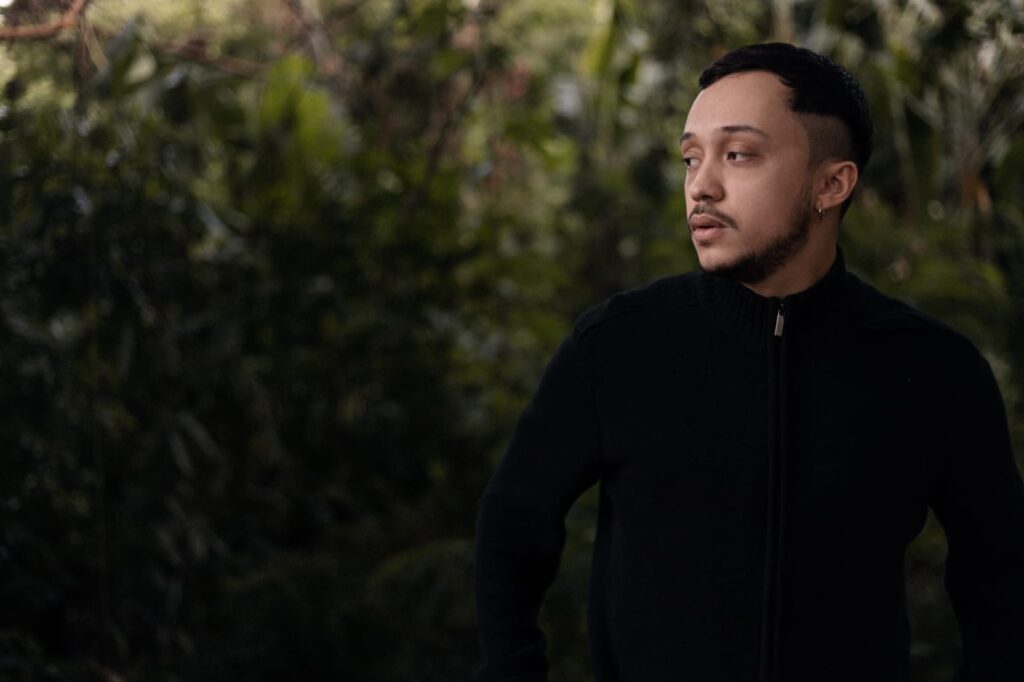
Credit Photo: Thiago Daher
Pensi che il Brasile e il Portogallo siano simili da questo punto di vista?
Non è la stessa cosa, è diverso, ma ci sono così tanti brasiliani che vivono in Portogallo adesso che a volte mi sento a casa. Però, in Europa la scena techno è migliore per la carriera, perché ci sono più locali, più contatti, ed è più facile fare networking con persone che condividono la stessa visione.
Negli ultimi anni hai suonato in club e festival iconici come Awakenings, Berghain e Bassiani. C’è un luogo in cui ti senti particolarmente connesso o che ti rappresenta veramente come artista?
Sì, direi che Berghain e Bassiani sono due club in cui mi sento molto connesso, e sento che c’è una connessione reciproca tra me e questi luoghi. Posso suonare quello che sento, e ha senso, si collega con il mio suono. Mi piace anche suonare nei festival come Awakenings, ma Bassiani ha un posto speciale nel mio cuore. È un luogo speciale.
Come descriveresti la tua musica a qualcuno che non ti conosce? E quali elementi sono stati e sono ancora fondamentali nel tuo percorso musicale?
Domanda difficile. Direi che è una musica energica e molto ballabile, con tocchi di futurismo, un design sonoro differente. Al tocco moderno che la techno possiede, cerco di aggiungerci qualcosa in più, come un passo avanti, un senso di futurismo che può essere presente in modi diversi a seconda dell’artista. Io cerco di metterlo a modo mio.
Per me, soprattutto nella techno, i bassi sono molto importanti. È qualcosa su cui ho lavorato molto nel tempo per farle suonare al meglio, perché le basse frequenze sono ciò che ti fa sentire fisicamente la musica. E nella techno, questa cosa è essenziale; cerco sempre di metterla in risalto.
Dal tuo debutto nel 2020, hai pubblicato su labels con identità sonore molto diverse, come Rekids Special Projects, Token e Spazio Nero. Dal punto di vista di un producer, come affronti il fatto di adattare il tuo suono all’estetica di un’etichetta, mantenendo comunque la tua autenticità artistica? Alcune etichette ti spingono ad esplorare approcci diversi?
Sì, in un certo senso. Cerco di non adattarmi completamente, al 100% a un’etichetta, ma ogni volta che lavoro con una label ci sono delle influenze. Ad esempio, non metterei un suono troppo profondo e complesso su un’etichetta che è più orientata al dancefloor, o più “facile da digerire”.
Ogni EP pubblicato su una label diversa rappresenta un “Marcal” diverso, ma è sempre me stesso, con un tocco dell’identità di quella specifica etichetta. Quindi sì, è importante per me pubblicare musica su label con cui mi identifico, ma ognuna mi porta qualcosa di nuovo, anche nella mia arte e nella mia musica.
Cerco, comunque, di non forzare le cose, lascio che fluiscano in modo naturale. E certo, alcune etichette mi spingono a esplorare lati della mia musica che nemmeno io conoscevo.
Quest’anno è stato piuttosto intenso per te: il debutto su Spazio Nero a maggio, e un EP in arrivo sulla label in vinile di Freddy K. Puoi raccontarci qualcosa in più su questi progetti? In che modo sono diversi o connessi tra loro?
Sì, come dicevo, queste etichette sono molto importanti per me. Le rispetto molto, ma allo stesso tempo hanno identità diverse. È proprio per questo che, come ho detto, puoi ascoltare musica diversa da me su ognuna di esse. Noterai che un EP è più profondo, l’altro più “funzionale”, con tracce facilmente mixabili per i DJ che suonano in vinile, per esempio. Alcuni hanno vibes più strane, più deep. È tutto parte di me, ma espresso in progetti diversi e su etichette differenti.
Grazie mille per essere stato con noi
Grazie a te
ENGLISH VERSION
From Brazil to Portugal and across Europe: interview with Marcal
On the occasion of his upcoming set at Notorius in Turin for Genau on September 13rd, we had the pleasure of speaking with Marcal — one of the most compelling and promising artists on the contemporary techno scene.
Raised in Brazil, Marcal channels a constant tension between tradition and experimentation into his sound. His sets and productions are a dynamic weave of hypnotic grooves, razor-sharp percussion, and driving basslines — executed with a precision that never loses its intuitive edge.
Initially known for his creative use of organic sounds and unconventional textures, his musical path has recently taken a more percussive turn. Influences from Samba and Bossa Nova are no longer nostalgic references, but active tools he uses to sculpt a techno that is fluid, vibrant, and deeply rhythmic.
His music has found its way onto some of the most essential labels in the electronic scene, including Rekids, Enemy, and Token — imprints that have become expressive spaces perfectly aligned with his identity, allowing him to shape a uniquely recognizable sonic manifesto.
Since the spring of 2025, Marcal has embarked on a tour that reflects his golden moment: a standout performance at Awakenings Upclose Festival, unmissable dates at Berghain, and a closing set at Bassiani during his second gig in Tbilisi. Each stop is further proof of his ability to transform the dancefloor into a fully immersive experience.
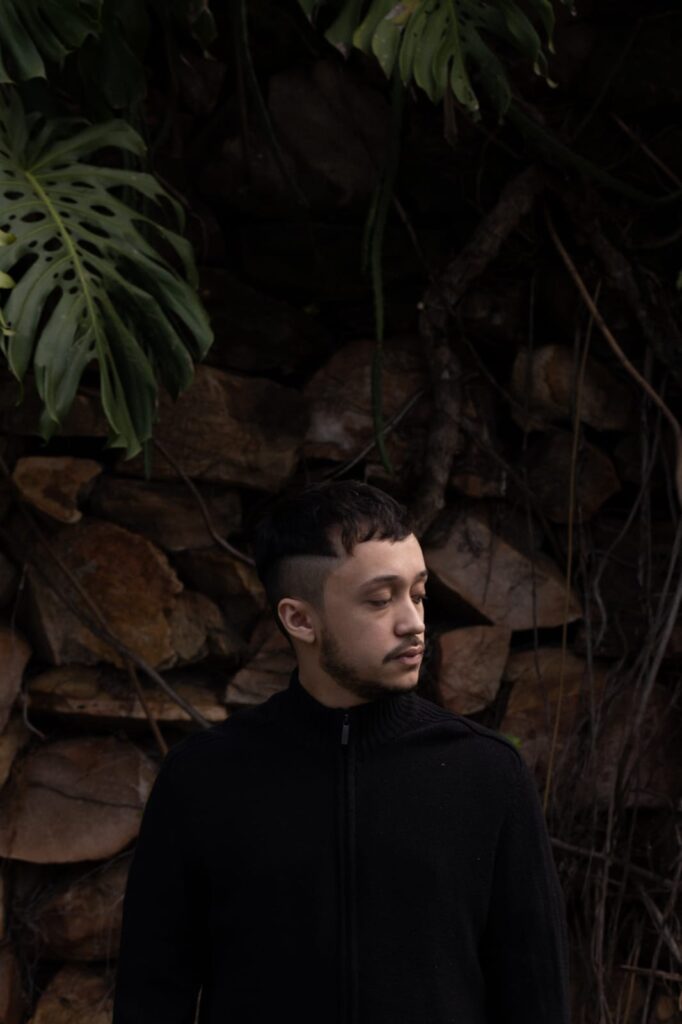
Credit Photo: Thiago Daher
On the occasion of his set on September 20 at Notorius in Turin and the new release on Freddy’s K label that you ore order here, we had the pleasure of delving deeper into his music and his ongoing research. Below is the full interview.
Hi Marcal and welcome to Parkett! How are you doing these days? And it’s great to have you in Turin. How are you feeling ahead of the show and what does Italy represent to you?
Yeah, I’m really excited for tonight, It’s my first time in Turin! Italy represents for me a lot of history and a lot of future, ancient history, and also a lot of good food. And I’m really excited for tonight and to make people dance and have a good time.
And I’d like to ask you about your roots. You were born and raised in Brazil, and how did you expect it to use your music? And do you think it has always have the same impact on the sound that you use in the tracks?
Yes, definitely. I think my sense of groove and rhythm comes a little bit from the Brazilian roots and my Brazilian roots. I like to listen to a lot of Samba, Bossa Nova, and I think it reflects in my sound in some way. It’s something that I try to mix with techno that is, people say it’s like electronic music can be a bit robotic, but not entirely. You can put a lot of groove and a lot of organic feeling to it.
And so you are now in Porto. And how has this transition been? And in what way do you think this change has influenced your music as well?
I feel it not directly, but now that I’m located in Europe and I can easily travel to play and I’m having more shows, so that keeps me more inspired. But just the moving from Brazil to Portugal for me, it wasn’t that big of a difference, that big of a shock for me initially because the language is kind of the same and I feel sometimes at home in Portugal. For me, it was a nice transition and now I’m more located to have more shows and play more often.
Do you think that’s the same mode that Brazil and Brazil?
It’s not the same, but it’s different, but there’s so many Brazilians living in Portugal right now that I can feel at home sometimes. But in Europe, the techno scene is better for your career in some way because you have more venues, more context, it’s easier to network with like-minded minds, that kind of stuff.
Over the past few years, you’ve played at some iconic venues and festivals, Awakenings and to Bergain and Bassiani. Is there one place that makes you feel particularly connected or truly represented as an artist?
I guess I feel like, as you mentioned, Bergain and Bassiani are two clubs that really connect with me, with myself, and I connect with the clubs because I feel like I can play whatever I feel. It connects with my music. I also love to play in festivals like Awakenings, but Bassiani has a special place in my heart. It’s special.
How would you define your music to someone who doesn’t know you? And which elements are and have always been fundamental for you to read your music journey?
That’s a tricky part, a tricky question. I feel you would describe it like as energetic and very danceable music and still with touches of like futurism, like a different sound design. Some modern touch that we have in techno, but I try to add some futurism, that is present in different ways from different artists. But I like that I try to put it on my own way.
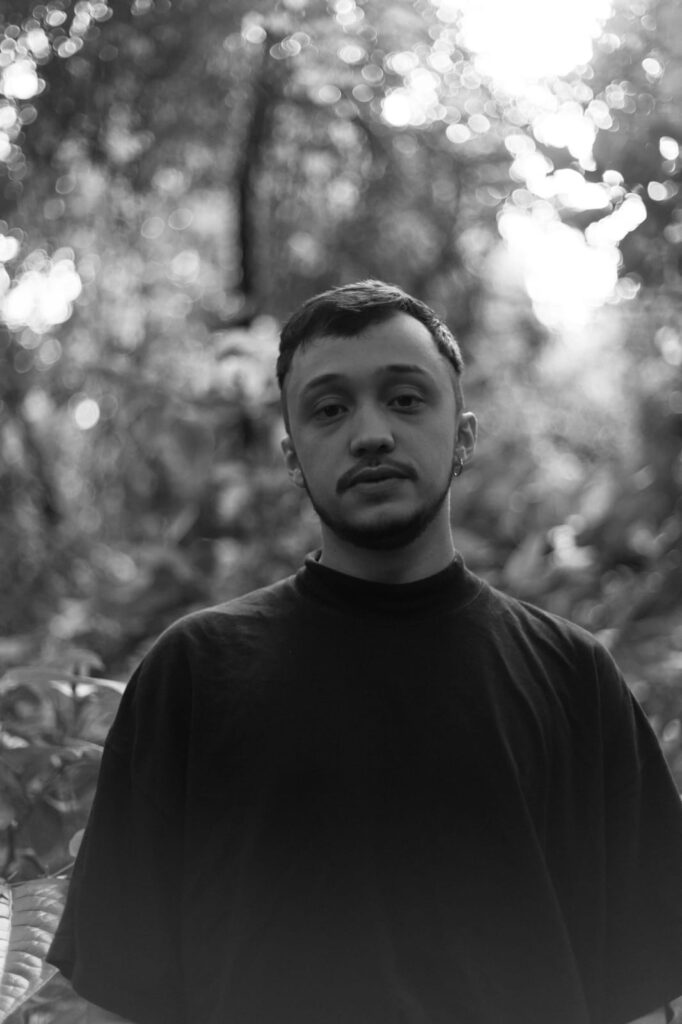
Credit Photo : Thiago Daher
I think especially for techno for me like the bass are the low aand it’s something that I really developed through the years to get it right, because the low frequencies are what makes you feel the music like physically. And I feel that especially in techno it’s very important, it’s something that I really highlight and try to stand it out.
Since your debit in 2020, you’ve released labels with listing sonic identities from ReKids special projects and Token to Spazio Nero. From a producer perspective, how do you approach tailoring your sound to fit a label’s aesthetic while still maintaining your own artistic voice? And do certain labels push you to explore different production or sound approach?
Yes, in a way. I try to release some music on this specific label and try to tailor myself to it 100%, but every time I work with a label. There’s some influences, like I would not put a very deep and complex sound to a label that it’s more like thanks to oriented or more, easy to digest in a way.
For example, yeah each EP in a different label you can see that it’s a different type of Marcal, but it’s still me and with the touch of this specific label. So, definitely, it’s important to release music on labels that I identify myself with, but it also brings something different even to my own art my own music the way. But I try not to force and make things flow naturally. And of course, some labels push me to even explore different signs of my own music that I even myself didn’t know about, you know.
This year has been quite full for you. Your Debut on Spazio Nero in May, your incoming EP on Freddy K’s Vinyl on the way. Can you tell us a bit more about this project and how they are different or connected with one another?
Yes, like I said, these labels are very important to me. I really expect all of them, but at the same time, their identity are different from each other. That’s why I just like mentioned like you can hear my different music through all of them, but you will notice that one EP is a bit more deeper, the other one is more for viable versus more tracks easily mixable for DJs that play vinyl, for example, And it is more like deep, weird vibes. So, it’s still part of me, but in different projects and labels.
Thank you to be our guest
Thank you!

